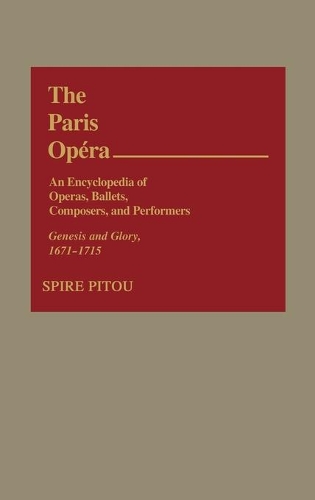
The Paris Opera: An Encyclopedia of Operas, Ballets, Composers, and Performers: Genesis and Glory, 1671-1715
(Hardback)
Publishing Details
The Paris Opera: An Encyclopedia of Operas, Ballets, Composers, and Performers: Genesis and Glory, 1671-1715
Bloomsbury Publishing PLC
Greenwood Press
28th December 1983
United States
Classifications
Tertiary Education
Non Fiction
Opera
Reference works
782.1094436
Physical Properties
Hardback
364
Width 156mm, Height 235mm
737g
Description
This encyclopaedia of operas, ballets, composers and performers begins with an introductory essay which aims to provide an appropriate overview and a necessary framework within which the detailed entries may be placed. It emphasizes entries for works, including operas, diverse lyric compositions and ballets, and biographical sketches, including composers, librettists, performers, directors, choreographers and administrators. The volume also contains extended synopses of unusual and obscure operas, as well as a repertory list of works dating from 1671 to 1715 in the appendix.
Reviews
[The introductory essay] does provide an appropriate overview and supplies a necessary framework within which the detailed entries may be conveniently placed. The encyclopedia proper emphasizes entries for works (operas, diverse lyric compositions, and ballets), and biographical sketches (composers, librettists, performers, directors, choreographers, and administrators). Although much of the material is already available in standard French sources, it is useful to have it here collected in accurate and accessible English translation. Similarly, the many extended synopses of unusual and obscure operas should prove exceedingly welcome and valuable. A repertory list (1671-1715) is included as an appendix; a bibliography lists standard references. Upper division undergraduate and graduate collections.-Choice
Pitou's introduction is excellent. His emphasis ... is on the Opera as an institution, an artistic enterprise tied from birth to the French government and subject to constant political interference as well as support. He does not ignore the music or the problems of changing forms of music drama, but he does not linger on minute distinctions of form. The result is an account of the Opera that does not lose its subject in the mass of detail. Pitou achieves his aim: to furnish an immediate orientation to the entire subject over the past three centuries.' No one ... has done it better.-The Opera Quarterly
"The introductory essay does provide an appropriate overview and supplies a necessary framework within which the detailed entries may be conveniently placed. The encyclopedia proper emphasizes entries for works (operas, diverse lyric compositions, and ballets), and biographical sketches (composers, librettists, performers, directors, choreographers, and administrators). Although much of the material is already available in standard French sources, it is useful to have it here collected in accurate and accessible English translation. Similarly, the many extended synopses of unusual and obscure operas should prove exceedingly welcome and valuable. A repertory list (1671-1715) is included as an appendix; a bibliography lists standard references. Upper division undergraduate and graduate collections."-Choice
"Pitou's introduction is excellent. His emphasis ... is on the Opera as an institution, an artistic enterprise tied from birth to the French government and subject to constant political interference as well as support. He does not ignore the music or the problems of changing forms of music drama, but he does not linger on minute distinctions of form. The result is an account of the Opera that does not lose its subject in the mass of detail. Pitou achieves his aim: to furnish an immediate orientation to the entire subject over the past three centuries.' No one ... has done it better."-The Opera Quarterly
"[The introductory essay] does provide an appropriate overview and supplies a necessary framework within which the detailed entries may be conveniently placed. The encyclopedia proper emphasizes entries for works (operas, diverse lyric compositions, and ballets), and biographical sketches (composers, librettists, performers, directors, choreographers, and administrators). Although much of the material is already available in standard French sources, it is useful to have it here collected in accurate and accessible English translation. Similarly, the many extended synopses of unusual and obscure operas should prove exceedingly welcome and valuable. A repertory list (1671-1715) is included as an appendix; a bibliography lists standard references. Upper division undergraduate and graduate collections."-Choice
Author Bio
tou /f Spire
